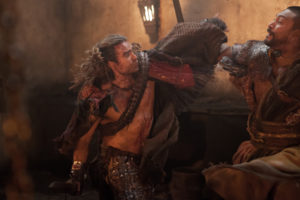The end for Spartacus draws ever nearer. What sort of end will it be? And will it mark the end of the man as well as the show?
“Did I not tell you that you should run?” Caesar tells Agron, Saxa and Donar as Crassus marches triumphantly into the city, flanked by his scarlet-clad army. What happens next is a brief but epic battle, with rebels and Romans battling for their lives in the blood-soaked streets.
The episode brings to mind Spartacus’ line from the previous episode, “I am done with words.” Launching immediately into this fight underscores his statement, and the only sounds we hear are screams and metal clashing against metal, and the occasional body thudding to the ground.
Gannicus offers to provide distraction to gain Spartacus and the others time to flee the city. He says he’s more expendable than Spartacus, his passing of lesser concern. He encounters Sibyl as he remains behind, and tells her to stay by his side. She was unable to get away, and now he takes responsibility for her safety. The scenes between Gannicus and Sibyl are . . . sweet, for lack of a better word. When he’s around her, he’s no longer the crude and violent gladiator. He’s protector, older brother. She looks up to him and idolizes him, but she is unable to fight at his side as Saxa does.
As Spartacus prepares to leave through the northern gate, he and Crassus finally gaze upon each other. He makes it out under the falling gate just in time, but now he and his foe have set eyes upon each other. They know the face of their enemy. When Crassus called out Spartacus’ name and he turned, I’m surprised no one took the opportunity to strike him down.
Gannicus and Sibyl, still trapped inside the Roman occupied city, must hide beneath the floor of one of the buildings. As the Romans systematically search for those unable to flee with Spartacus, we experience tense moments, wondering if they will be discovered. Gannicus finally takes the offensive and kills the Romans above them, helping Sibyl leave their hiding place.
Meanwhile, Kore is overjoyed to learn she’s to leave follower’s camp and possibly escape Tiberius, who warns her not to tell anyone how he assaulted her. She is heartbroken at what he has done, when she has been as a mother to him, and it no doubt casts shadow upon her relationship with Crassus.
Ah, Crassus. Hard to believe he truly loves Kore, when he can be such a cold-blooded villain. Laeta is allowed to bathe and wear makeup and pretty clothes (a luxury not afforded to her as prisoner of war), thinking she is to dine with Crassus, but he turns her over to Heracleo the pirate. The Imperator cannot let go of the fact that she offered any aid to Spartacus, even though it was to help her fellow Romans. But isn’t it hypocritical? Caesar, masquerading as a rebel, also lent aid to the enemy. The only difference seems to be he was under orders while Laeta had to forge her own path in the lions’ den. But in contrast Caesar is rewarded with celebration while Laeta becomes a spoil of war.
Heracleo brands her, reducing the former noblewoman to that of slave. However, Gannicus swoops in to save the day, killing Heracleo and helping Laeta flee the city. As a freed slave, she is now on their side, but how long will freedom, and life, last? Spartacus and his army are now trapped on a snow-covered ridge, and no doubt the white ground will soon be covered in red.
